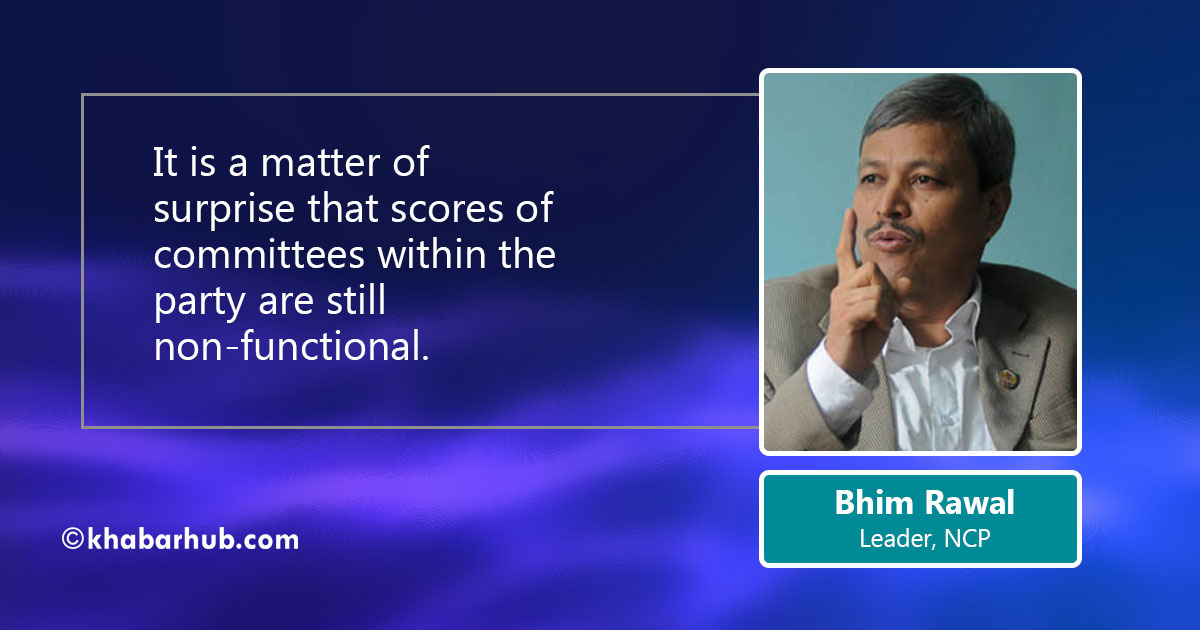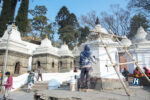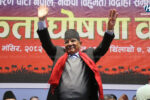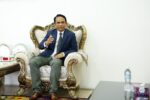Bhim Rawal, a leader of Nepal Communist Party (NCP), known for his straight forward remarks, is considered expert in both domestic politics and foreign affairs besides being a left ideologue. He is a member of the standing committee of NCP. Elected Member of Parliament from Achham constituency-1, Bhim Rawal appears to be disillusioned with the present state of affairs of country’s politics. Having experienced both within the government as well as party leadership, Rawal is no ordinary man in Nepali politics. He has been to responsible positions such as Deputy Prime Minister and minister of several portfolios such as defense, home affairs, and tourism. Rawal speaks on a number of issues bothering the country now. Excerpts:
Your party is going through a bad patch as chairman Pushpa Kamal Dahal has questioned the commitment of another chairman K P Oli who also happens to be the Prime Minister. What happened to the unification process?
The foundation of unity between both the parties lies on the shared vision of taking Nepal away from a state of dependency on others towards being ‘self-dependent’. It is a matter of surprise that scores of committees within the party are still non-functional resulting in confusion and chaos amongst both the leaders and party workers as to what is the future course of action of the unified party. Unity amongst all the leaders and party workers right from the top to bottom has not succeeded in blocking us to discuss and devise matters of national and international importance. Unity between the two parties has not been actualized in reality at the ground level.
Is the political work amongst the cadres of both the communist parties not sorted out to make them function together in unison? Does the ideological difference between the two former communist parties still persist?
What the country is discussing about ‘5-points agreement’ between the two parties in open is nothing new as it is already known to all that unity on paper is still awaiting its ‘execution’ at all the levels down to grass root level. It is just that one chairman is reminding another chairman about the terms of the agreement that he must have postponed if not discarded due to the pressure of running the government.
Dahal wants to lead the party alone when Oli is busy leading the government. Do you think suggestion such as this will help the unity between the parties and save Nepal Communist Party?
There are several such issues which many of us are aware of while there are still other issues which only our two chairpersons of the present ruling party know well. There are senior leaders from both the parties who were witness to such terms of agreement and commitments when unity was struck to form Nepal Communist Party. However, fault lines between Maoist (Center) and CPN-UML still exist which need to be smoothened to create a pool of workers to follow and pursue the principle and ideology of newly created political party – Nepal Communist Party. It is not in good taste politically to overturn the entire terms and conditions which were written clearly and agreed upon formally by the leaders of both the parties for the unity process to complete. The formal agreement leading to unity between the parties must be adhered to as it existed then without giving damn excuses and pulling political stunts.
It appears that only Dahal and Oli got their political ambitions fulfilled by this unification at the expense of sacrifices made by huge workers and other leaders at lower levels. Is it the right away to run and manage a political party?
Of course, I agree with what you said. I feel that the change of a person without changing our political decision and existing laws is not going to address the national issues of the country. I had proposed for unity on conditions that new party will provide political stability without compromising on our national pride, territorial integrity, and national sovereignty. Unfortunately, national issues are not getting any ‘space’ within the party discussion. If we follow the procedures and principles on which a ruling party is founded, I don’t see any problems will bog us down and propel us in any unseemly controversy like the present one.
It has been alleged that there is no inner democracy within the party. Decisions are simply imposed from the top and others are forced to follow. How does your political party following such undemocratic practices will lead a democratic country?
We practice competitive democracy. If we agree to some issues, we can further disagree with the same person on some other issues. This is the spirit of competitive democracy and we are not letting it go. It further means that others are not completely annihilated while you put across your points of view without fear of being stigmatized politically. General meeting of the party must discuss the modality of electing and selecting top leadership within the party. A new party ‘Communist Party of Nepal’ has been formed in which two communist parties with different political, organizational and structural base have decided to come together. It is just a matter of time when leaders and workers of present ruling party through all the hierarchical ladders will get streamlined in a democratic fashion. Our party is not for any political governance other than democracy. After having gone through the phase of political transition, we are still not done with unity between CPN-Maoists and CPN-UML. It is really sad.
There is the talk of ‘one person, one post’ within the party. In this context, a leader who gets elected or selected within the party will hold the office. What is about others – let us say people like you?
We are currently passing through a transition period within the party. Therefore, we must follow the things which are settled through consensus amongst us. If consensus breaks down, then that should be brought for discussion within the party. I was the vice-president of my party before besides being a member of the standing committee. Standing committee and the central committee of the party must find solutions to the problems and confusions leaders and workers are facing. Tittle-tattle in a corner of a room or in secretariat will simply aggravate the situation at the political level. A political party must have an annual general meeting and a political party must not revolve around the personality of a person. Developing a personality-cult within a democracy kills a political party. Yes, a particular person can dominate political space in a country for some period to lead the people for fulfilling their aspirations. That is all. It is not a dictatorship. People are supreme in a democracy. A strong leader in a democracy does not mean he is a dictator. People desert those who desert them in democracy.
What do you suggest how to go for dividing the responsibilities in and through top, middle and bottom level leadership in view of proposed unity between the parties in the present context?
Standing committee is the only forum to discuss all these. Responsibilities within the party are allotted judiciously. ‘What conditions will get applied and when’ is the key to complete the process of unification, but it didn’t happen as of now. It is more than a year and we are still in a debate at the national level as to who will do what. Citizens of Nepal are critically analyzing how effective the government and political party have been in the last one year. This is the time of reviewing the performance of the government. Left governments are functioning all over Nepal both at federal and provincial levels. How different are we compared to previous governments in a matter of delivering good governance and bringing development all across Nepal? Isn’t it the right question to ask? Why suppress public debate on an issue like this?
You can settle the differences within your party and address all the grievances raised within. But, the people are not satisfied and party workers at the grass root level are grimacing. People can come in the street to raise the banner against the present government any time from now. The future of ‘left’ politics is at stake in Nepal. How do you respond to this?
I don’t see any possibility of rebellion among the people. Yes, people are disappointed with the performance of the present government. They are dissatisfied as the strong majoritarian government is failing in its agenda. I personally feel that people aspirations have not been met and they are feeling betrayed by the government. Whatever we had promised during elections have not been fulfilled. I am with the people as declarations of communist party manifesto and other issues of national interest are still pending waiting to be implemented. Government and political party are just the means to work for the welfare of people as service to the nation is the ‘end’ of democratic politics.
What position do you want to hold within the party right now?
It is not that what I want to become rather where I fit in the whole scheme considering the need of the nation, party workers’ desire and people’s demand, matter the most. I am ready to serve in any position at whatever level if it is in the interest of people of this country and in the national interest.
Talking about national interest under the government holding 2/3rd majority, talk on general elections in India swept the discussion all around the country. Why should we discuss India at this scale in Nepal? There are people who link outcomes of Indian elections with the future course of Nepali politics. Isn’t it shameful? What kind of national feeling is this?
India has been the ‘topic’ of political talk within Nepal since 1951 and thereafter. It is very natural to have such talk within our country. I feel that there are issues of national importance in which our previous governments made mistakes. What I feel that if our foreign policy works independently only and only in our ‘national interest’ discarding the Indian concerns, India will be out of Nepal. The political influence of India in Nepal will weaken in due course of time and die down ultimately. India is dominating Nepal using its military, diplomacy and political strategy. What I suggest that both the Communist Party and the incumbent government must correct the past mistakes to end the influence of India in Nepal totally and completely. Our party can do it and I must say that political will is needed to end the influence of India in Nepal.
You are talking about ‘national pride’ and ‘national interest’ in the context of ending Indian influence in Nepal. However, Nepal is participating in joint military exercises. What kind of nationalism is this?
Nepali Congress, the first political party of the country, is to be blamed for allowing India to enslave and colonize Nepal. It is Nepali Congress that allowed democratization in Nepal Army making it weaker in strength. Our foreign policy also incorporates the spirit of democratization and show flexibility. It should not happen and we must follow hardcore policy against India without changing it a bit. We must discard all the treaties and political agreements between Nepal and India signed by Rana rulers in the past. We are communists and we believe in exclusive and independent foreign policy.
There is no point in aligning Nepal’s foreign policy with that of India. Nepal must stand alone without India in matters of foreign policy and otherwise. Our foreign policy should not and must not go with Indian foreign policy. Why should a present communist government allow ‘joint military exercise’ in Pokhara? I am also raising this question out of sheer surprise.
I am a member of the standing committee and I am not aware of this anti-national activity, least of all the communist party of Nepal. We need an overhaul in entire government machinery- Home Ministry, Defense, Investigative Agencies and others. Foreign ambassadors are out in the country interacting with our people and our government is a mute spectator to it. We must stop all kinds of interactive sessions between the ambassadors and people of Nepal. Codes of conduct for ambassadors mentioned in the Vienna convention must be pressed into action.









Comment